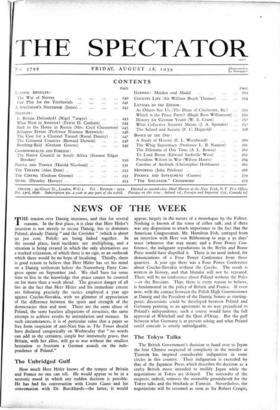The Tokyo Talks
The British Government's decision to hand over to Japan the four Chinese suspected of complicity in the murder at Tientsin has inspired considerable indignation in some circles in this country. Their indignation is exceeded by that of the Japanese Press, which describes the decision as a crafty British move intended to mollify Japan while the negotiations in Tokyo are delayed. The surrender of the suspects, indeed, removes the ostensible groundwork for the Tokyo talks and the blockade at Tientsin. Nevertheless, the negotiations will be resumed as soon as Sir Robert Craigie, the British Ambassador, receives his instructions from Lon- don. It is clear that they can only deal with the wider issues which have been raised by Japan since the original incident in Tientsin ; but the British Government has no intention of discussing the silver reserve and the currency question in isolation from France and the United States. But the progress of the talks should be made easier by the departure from Tokyo of the Tientsin military delegation. Indeed, it seems as if military influence on Japanese policy has suffered a setback. Discussions in the Cabinet of the Foreign Office's formula defining Japan's co-operation with the Axis have been conducted in the greatest secrecy ; but opinion in Tokyo is convinced that the Cabinet's decision is to reject, as in June, a military alliance, and that its decision has been accepted, at least for the time being, by the Army.







































 Previous page
Previous page